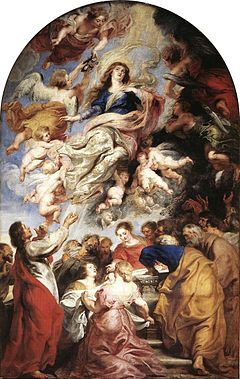A blessed and joyful solemnity of the Assumption, the greatest of the feasts of Our Lady, commemorating her entrance into heaven, body and soul, ‘at the end of her earthly life’, as the 1950 Apostolic Constitution Munificentissimus Deus of Pius XII put it. Besides her many other attributes, and the signs that the life of the Immaculata offers, the Assumption signifies our future resurrection, when we too, if we live a life of grace, will be reunited with our own bodies, spiritualized, as Saint Paul put it, and ‘redounding with the glory of our souls’, as Saint Thomas would later describe it.
Of course, one cannot ‘describe’ heaven (as Saint Paul again confessed), and Our Lady lives in a realm beyond space and time, her body not localized like ours. That said, she can still have a personal, maternal relationship with each one of us (in fact, like Christ, that is the very reason she can do so). As she said to Saint Juan Diego, ‘am I not your mother?’
We have to get past the idea that Our Lady (and Christ, as Father Tim McCauley points out today) are distant, shadowy, ethereal and, yes, powerless figures, distant and far away. Not at all. They are more real than we are, right here before us, and the only reason we cannot see them is the veil before our own eyes (lifted as a grace for some saints, like Saint Jean Vianney, who was once seen speaking with Our Lady one on one, a story I heard told once of Pope John Paul II).
Good mothers look after their children (as I saw in many a train station and airport). But they also at times ask difficult things of them, so they can develop their full potential. Hence, follow Mary, wherever she asks you to go. As she said to Saint Bernadette, ‘I do not promise to make you happy in this life’ (although there may be some such happiness, I might add), ‘but the next’.
And it is on that next life, on the ‘things that are above’, that we should set most of our focus and energies.
As the motto of Pope Saint John Paul II put it (whose tomb I just left yesterday, hard to believe), which he adopted from Saint Louis de Montfort’s own devotional writings:
Totus tuus ego sum, et omnia mea tua sunt.
Maria Immaculata et Assumpta, ora pro nobis!










